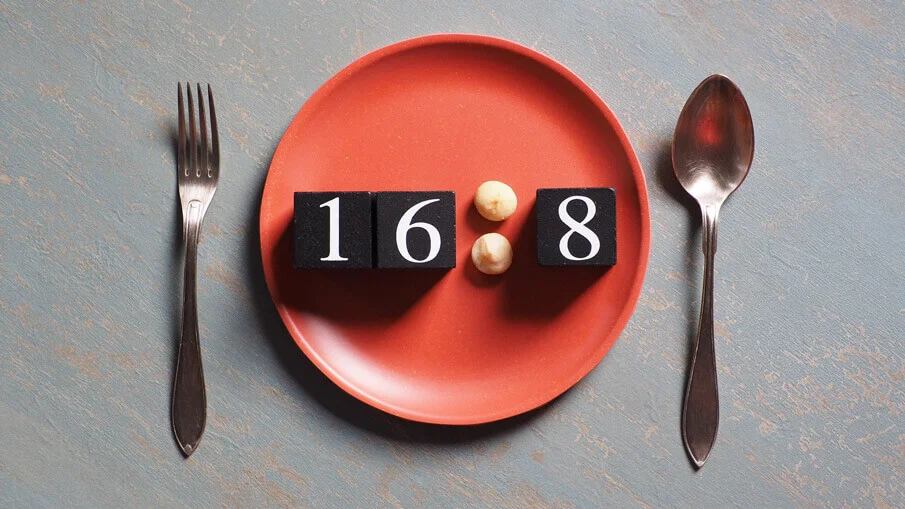
16-8 DIET: THIS IS HOW EFFECTIVE INTERMITTENT FASTING IS WITH THE EIGHT-HOUR DIET
Reading time: 03:39 minutes
Table of contents
1. INSTRUCTIONS FOR THE 16-8 DIET
The 16-8 diet is easy to follow. You can eat two or three meals a day - but they should all take place within an eight-hour time frame. This is followed by the fasting phase: there are two phases. In the first phase, nothing is eaten for eight hours - not even snacks or light meals. The second phase (a further eight hours) is dedicated to sleep. The fasting phase before sleep is intended to stimulate fat burning overnight.
The challenge with the 16-8 diet is to organize the day accordingly. For example, if breakfast is eaten at 9 a.m., dinner must be eaten by 5 p.m. at the latest.
After 5 p.m., nothing else may be eaten until 9 a.m. the next morning. It is best to find out for yourself what rhythm is good for your body. If breakfast is eaten before work, e.g. at 7:30 am, then fasting begins correspondingly early - in this case from 3:30 pm. For many people, a late breakfast is more pleasant - they have their first meal at around 11 am, so that their evening meal takes place before 7 pm. Before breaking the fast in the morning, nutrition experts recommend a sports session to stimulate fat burning.
2. WHAT CAN I EAT AND DRINK DURING INTERMITTENT FASTING?
During the fasting phases of the 16-8 diet, you can drink water, unsweetened teas, thin vegetable broth and black coffee. During the eight hours in which you are allowed to eat, you should of course not necessarily indulge in a cream cake. However, it is sufficient to eat a balanced diet - with plenty of fresh vegetables, pulses, dairy products, eggs, some fruit, nuts, seeds, wholegrain products and sources of valuable fatty acids such as fish, olive oil or avocado. Alcohol and sweets should only be consumed in moderation. It is important to ensure that meals on the 16-8 diet are not more substantial than usual so as not to consume too many calories.
3. ADVANTAGES AND DISADVANTAGES OF THE 16-8 DIET
The 16-8 diet is considered a healthy way to lose weight. The fat metabolism is optimized and the body does not have to break down muscles to gain energy. The fasting phase often has a positive effect on the quality of sleep, as the body needs less energy for digestion at night. In addition, the 16-8 diet can usually be implemented without a major change in diet: You don't have to give up your favorite foods - and the diet can also be easily implemented as a vegetarian or vegan diet. Part-time fasting also appears to have other benefits - for example, there is evidence that it reduces the risk of cancer and dementia1. However, the effectiveness of intermittent fasting in helping people lose weight is controversial. The German Nutrition Society (DGE) is skeptical about the 16-8 diet. The explanation: the diet lacks clear guidelines for a healthy and nutritionally sensible selection of foods.
It believes there is a risk that people may eat fatty and sugary foods during the eight hours, as they develop cravings after the fasting interval. However, studies have not confirmed these concerns. Experiments on mice have shown that the 16-8 diet can prevent obesity2 - however, findings from mice cannot be easily transferred to humans. A US study from 2020 found no significant advantage of the 16-8 diet in terms of weight loss3. To be on the safe side, the 16-8 diet should therefore also be accompanied by a balanced diet and exercise.
4. WHO IS THE 16-8 DIET SUITABLE FOR?
The 16-8 diet is suitable for anyone who wants to lose weight without having to follow a complicated diet plan. It does not usually lead to rapid weight loss, but it can help you lose pounds in the long term or keep the weight off permanently after a diet. If you don't want to starve yourself for 16 hours a day, you can also try two fasting days a week - this form of intermittent fasting is called the 5-2 diet.
Intermittent fasting, as with the 16-8 diet, should always be treated with caution if you have a pre-existing medical condition. People who suffer from problems with the pancreas, thyroid or diabetes should not follow the 16-8 diet or should at least consult their doctor beforehand. Intermittent fasting is also usually not a good idea if you have low blood pressure, chronic illnesses, cancer or are pregnant or breastfeeding
CONCLUSION
The 16-8 diet is a form of intermittent fasting that is easy to implement in everyday life and helps you lose weight or maintain your desired weight. If you are very overweight or want to lose weight quickly, a more effective slimming diet such as the low-carb diet is often more suitable.
Sources:
1Specialist article: Time-restricted eating may prevent tumor growth. Medical News Today, Link:https://www.medicalnewstoday.com/articles/324803
2Study: Amandine Chaix et al.Time-restricted feeding is a preventative and therapeutic intervention against diverse nutritional challenges, Link: https: //www.ncbi.nlm.nih.gov/pmc/articles/PMC4255155/
3Study: Dylan A. Lowe et al. Effects of Time-Restricted Eating on Weight Loss and Other Metabolic Parameters in Women and Men With Overweight and Obesity, Link: https: //pubmed.ncbi.nlm.nih.gov/32986097/
